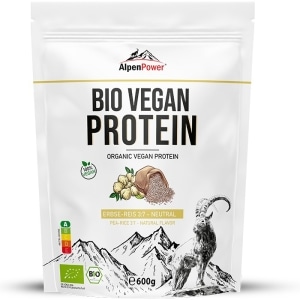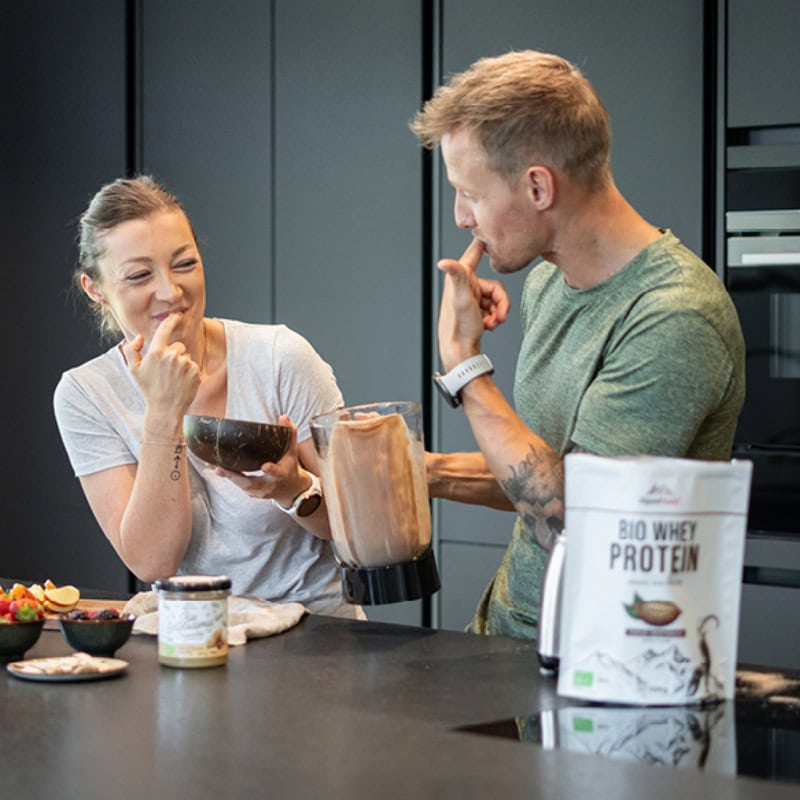An article by Michaela Mayr,
certified nutrition trainer:
https://www.michaelas.net
Vegan protein: better or worse than whey protein?
Proteins are an essential part of a balanced diet, especially for those focusing on fitness, muscle building or weight management. As essential building blocks of muscle tissue, proteins not only promote muscle recovery but also play a crucial role in numerous bodily processes.
But in the debate about the ideal source of protein, many people ask the question: is vegan protein better or worse than whey protein?
The basics: What’s the difference?
Whey is the English word for whey, which is a by-product of milk processing. A special variant is native whey isolate, which is filtered directly from the milk. Whey protein is of animal origin and is known for its high bioavailability and rich content of essential amino acids. Find out more about whey protein here.
Vegan protein powder, on the other hand, comes from plants such as hemp, rice, peas and soy. These sources not only provide protein, but also a wealth of additional nutrients and health-promoting properties. In addition, protein intake from vegan protein powder is often associated with less saturated fat and cholesterol.
Vegan protein: it’s all in the mix
When it comes to building muscle, amino acids count. Whey protein has long had the upper hand, thanks to its complete amino acid profile and rapid absorption.
But vegan protein powder is catching up. Individually, vegan protein sources often do not have a complete amino acid profile, but by combining different plant-based proteins, such as rice and pea protein, this deficit can be compensated for.
Want an example? Rice protein is rich in methionine, a sulphur-containing amino acid, at around 2.4 grams per 100 grams, but low in lysine. In contrast, pea protein contains a lot of lysine, but offers less methionine, around 0.9 grams per 100 grams. By combining rice and pea protein, the amino acid profiles of both plant proteins complement each other, resulting in a more balanced amino acid profile that is more similar to that of whey protein.
Note: The exact details may vary depending on the manufacturer and specific product formulation. Here you can find an overview of our rice and pea proteins.
“Modern blends of hemp, rice, pea and soy protein now also offer a complete amino acid profile and can effectively support muscle building.”
Health: More than just protein
Vegan protein powder offers numerous health benefits over and above the mere protein intake. Hemp protein, for example, is rich in omega-3 and omega-6 fatty acids, which support the cardiovascular system. Rice protein is hypoallergenic, making it a great option for people with allergies or intolerances. Pea and soy protein are again good for digestion and can help lower cholesterol levels.
Conclusion: A question of perspective
Is vegan protein better or worse than whey protein? Both vegan protein powder and whey protein have their advantages. Both options are successful for muscle building, but vegan protein powder scores with additional health benefits and a positive contribution to environmental protection.
Ultimately, it comes down to what works best for you and your body. Experiment a little, listen to your body and find your favorite.
Do you still have questions about protein? Our nutrition expert Michaela shares a rough fact check on protein powder and her opinion on vegan alternatives in the podcast “Michaelas – Am Küchentisch”.
Do you have any questions?
Do you still have questions about protein? Our nutrition expert Michaela shares a rough fact check on protein powder and her opinion on vegan alternatives in the podcast “Michaelas – Am Küchentisch”.
An article by Michaela Mayr,
certified nutrition trainer:
https://www.michaelas.net






